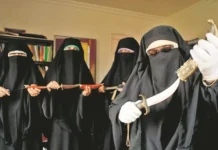KABUL (Afghanistan), Dec 11 (NVI) Khalil Rahman Haqqani, Minister for Refugees in Afghanistan, was killed today in a suicide bomb attack in a mosque here, amidst growing differences between the Haqqani network and the Taliban leadership.
According to reports, Khalil Haqqani was leaving the mosque when a suicide bomber detonated himself.
Three of Khalil Haqqani’s bodyguards were also killed in the blast.
It was not clear immediately as to who was responsible for the attack.
Khalil Haqqani was the uncle of Sirajuddin Haqqani, the chief of Haqqani network and First Deputy Leader and Interior Minister in the Afghan government.
Sirajuddin and Khalil were the only two from the Haqqani family to be included in the Afghan government headed by Taliban leader Hibatullah Akhundzada in August 2021 when a democratically-elected government of President Ashraf Ghani was overthrown in a bloodless coup.
Significantly, the assassination of Khalil took place just two days after Sirajuddin Haqqani made a veiled public attack on Taliban’s supreme leader Akhundzada over monopolization of religion.
Addressing a graduation ceremony at a Madrassa in Kabul, Sirajuddin Haqqani said, “Religion should not be represented in a way that suggests it belongs solely to me, to the exclusion of others.”
His comment came against the backdrop of reports of divisions within the Taliban’s leadership, particularly over Akhundzada’s hardline policies.
Prior to Sirajuddin’s public outburst, Afghanistan’s Higher Education Minister Neda Mohammad Nadeem, who is considered close to Akhundzada, said that anyone criticizing the Taliban is “an infidel and an apostate.”
Apparently responding to Nadeem’s remarks, Sirajuddin Haqqani said religious scholars should focus on constructive reforms while being mindful of their words and actions.
“Reforms must come through effort, and scholars should reflect on the current state of affairs without bringing disrepute upon themselves,” he said.
Without naming specific individuals or groups, Sirajuddin Haqqani expressed concern about the growing public disillusionment with religious figures.
“The title of religious scholar should not be tarnished. Today, the problem is that scholars are so disparaged that people fear for their faith because of the actions of others,” he said.
“If people are leaning toward disbelief or corruption, it reflects the shortcomings of those in power,” Sirajuddin Haqqani said.
His remarks came as the Taliban is facing growing criticism for increasingly restrictive policies, including a recent ban on women pursuing medical education, which has further curtailed opportunities for women and girls. (NVI)








